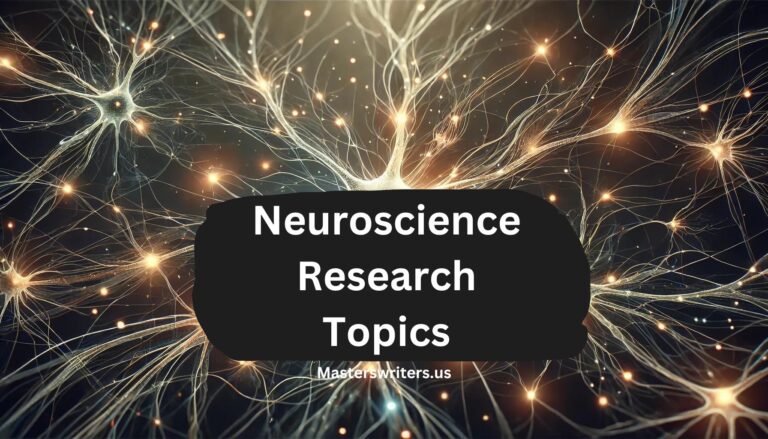Topics
125 Neuroscience Research Topics for College Students


Have you ever zoned out mid-conversation or forgotten what you were about to say? Happens to the best of us. One second, you’re laser-focused, and the next, your brain decides to take a mini-vacation. It’s frustrating and intriguing to realize how much your brain handles at any given moment—processing thoughts, emotions, memories, and all those daily tasks.
Neuroscientists dedicate their careers to unravelling these mysteries. They dive into questions like why our memories fade, how we learn new things, and what’s going on in our brains when we’re feeling stressed or excited.
Here’s something cool: your brain is home to around 86 billion neurons. That’s more than the number of stars in the night sky. These neurons form complex networks, controlling everything from your heartbeat to your problem-solving skills. Yet, with all this activity, there’s still so much we don’t fully understand. Why do some people seem to learn faster? What happens in the brain during moments of creativity or distraction?
In this article, we’ll explore some fascinating neuroscience research topics that might shift how you think about your mind.
What is Neuroscience?
Neuroscience is the scientific study of the nervous system, focusing on the structure and function of the brain, spinal cord, and neural networks throughout the body. It seeks to understand how the brain processes information, controls behavior, and regulates bodily functions. Neuroscience covers a wide range of topics, from how neurons communicate through electrical and chemical signals to how our brains create memories, control emotions, and respond to external stimuli. This field is interdisciplinary, combining biology, psychology, chemistry, and even computer science to explore the complexities of the brain and its impact on overall human function.
Need an essay helper for students? Visit Masters Writers for reliable writing assistance.

Looking for Research Help
Get your research crafted by professional writers who are experts in the field. Top-quality service from start to finish.
120 Neuroscience Research Ideas
Before diving into the fascinating world of neuroscience, it’s essential to recognize just how vast and varied this field is. From exploring how memories are formed to investigating brain disorders and cognitive functions, neuroscience touches on every aspect of our mental and physical well-being. Whether you’re interested in understanding the brain’s role in learning or unravelling the mysteries behind neurological diseases, there’s a wealth of research to explore. Here are 125 neuroscience research topics to inspire your next academic project.
Behavioral Neuroscience Research Topics
- How do stress and anxiety affect decision-making processes in the brain?
- The role of neurotransmitters in regulating mood and behavior.
- How does sleep deprivation impact cognitive performance and emotional regulation?
- Exploring the brain’s reward system and its influence on addictive behaviors.
- How does chronic stress alter brain function and behavior over time?
- The effects of social isolation on brain development and behavior.
- How do traumatic experiences influence long-term behavior and brain plasticity?
- Investigating the neural mechanisms behind impulse control disorders.
- How do hormones influence aggression and other social behaviors?
- The role of the prefrontal cortex in emotional regulation and decision-making.
- Can meditation and mindfulness practices change brain structure and improve behavior?
- How does the brain process fear, and how does it affect behavior?
Cognitive Neuroscience Research Topics
- The role of neuroplasticity in recovering from brain injuries
- How do different regions of the brain contribute to memory formation?
- The impact of aging on cognitive function and brain structure
- How does sleep affect cognitive processing and memory retention?
- Exploring the neural mechanisms behind decision-making
- What are the brain’s processes for learning new skills or languages?
- The effects of chronic stress on cognitive performance and brain health
- How does the brain adapt during multitasking?
- The influence of emotions on cognitive functioning and decision-making
- What are the neural correlates of attention and focus?
- The relationship between cognitive decline and neurodegenerative diseases
- How does the prefrontal cortex influence self-control and impulse regulation?
Neuroplasticity and Brain Development
- How does neuroplasticity change throughout different stages of brain development?
- The role of neuroplasticity in learning new skills and forming habits.
- Can early childhood experiences enhance or limit neuroplasticity later in life?
- Exploring the effects of trauma on neuroplasticity and brain recovery.
- How do neuroplasticity and brain development influence memory retention and recall?
- The impact of physical exercise on neuroplasticity in developing brains.
- What is the role of neuroplasticity in overcoming brain injuries or strokes?
- The relationship between neuroplasticity and cognitive development in adolescence.
- How does neuroplasticity contribute to recovery in neurodegenerative diseases like Alzheimer’s?
- The influence of neuroplasticity on language acquisition and multilingualism in children.
- How do modern technologies, like brain-training apps, impact neuroplasticity?
- Neuroplasticity’s role in emotional regulation and mental health during brain development.
If you are dealing with health-related topics, Masters Writers provides a trusted medical essay writing service.
Brain Disorders and Diseases
- The Role of Genetics in the Development of Alzheimer’s Disease
- How Does Parkinson’s Disease Affect Motor Control?
- The Impact of Multiple Sclerosis on the Central Nervous System
- What Are the Early Warning Signs of Huntington’s Disease?
- Exploring the Link Between Brain Inflammation and Depression
- How Can Epilepsy Be Managed Through Neural Interventions?
- The Neurological Basis of Autism Spectrum Disorders
- How Does Chronic Traumatic Encephalopathy (CTE) Develop in Athletes?
- The Role of Neuroplasticity in Stroke Recovery
- Can Brain Tumors Be Prevented Through Early Detection?
- The Effects of Schizophrenia on Cognitive and Emotional Processing
- How Do Migraines Affect the Brain’s Electrical Activity?
- The Relationship Between Brain Trauma and the Onset of Dementia
- How Does Amyotrophic Lateral Sclerosis (ALS) Progress Over Time?
- The Impact of Neurodegenerative Diseases on Mental Health
Neurogenetics and Epigenetics
- How do genetic mutations influence the development of neurodegenerative diseases?
- The role of epigenetics in memory formation and retention
- Can epigenetic changes in early life affect brain function in adulthood?
- Neurogenetics of autism spectrum disorders: Genetic markers and implications
- How does DNA methylation impact neural plasticity?
- The influence of genetic variations on susceptibility to mental health disorders
- What is the relationship between epigenetic regulation and cognitive decline in aging?
- Exploring the genetic basis of schizophrenia and its neural implications
- Can epigenetic therapies reverse neurodegenerative conditions like Alzheimer’s?
- The role of histone modification in regulating gene expression within neurons
- How do inherited genetic factors contribute to the risk of developing epilepsy?
- The impact of environmental factors on the epigenetic regulation of brain development
Memory and Learning
- The Role of the Hippocampus in Memory Formation
- How Do Emotions Influence Memory Retention?
- The Impact of Sleep on Learning and Memory Consolidation
- How Does Short-Term Memory Differ from Long-Term Memory in the Brain?
- The Effects of Aging on Memory Function
- How Does Neuroplasticity Contribute to Learning New Skills?
- Memory Retrieval: How the Brain Recalls Stored Information
- What Role Does Stress Play in Memory Loss?
- The Influence of Nutrition on Cognitive Learning and Memory
- Can Memory Be Enhanced Through Brain Training Techniques?
- How Do Different Types of Learning (Visual, Auditory, Kinesthetic) Affect Memory?
- The Relationship Between Working Memory and Academic Performance
Neurotechnology and Brain-Computer Interfaces
- The Future of Brain-Computer Interfaces in Treating Neurological Disorders
- How Can Brain-Computer Interfaces Enhance Communication for People with Disabilities?
- The Ethical Implications of Brain-Computer Interface Technology
- Can Brain-Computer Interfaces Help Improve Cognitive Abilities in Healthy Individuals?
- Exploring the Use of Neurotechnology in Virtual and Augmented Reality Applications
- How Do Brain-Computer Interfaces Work and What Are Their Current Limitations?
- Neurotechnology for Restoring Mobility in Paralysis Patients
- What Are the Potential Risks of Direct Brain-Computer Interface Connections?
- The Role of AI in Advancing Brain-Computer Interface Technology
- Can Brain-Computer Interfaces Be Used to Treat Mental Health Disorders?
- Challenges in Developing Non-Invasive Brain-Computer Interfaces
- How Might Neurotechnology Impact Human Memory Enhancement in the Future?
Sensory Processing and Perception
- How do different sensory modalities (sight, sound, touch) interact to shape our perception of the world?
- The role of the brain’s thalamus in sensory processing.
- How do individuals with sensory processing disorders experience everyday stimuli differently?
- The neuroscience behind optical illusions: Why do our brains perceive things that aren’t there?
- What happens in the brain when sensory overload occurs?
- Exploring the link between autism and sensory processing differences.
- How does the brain filter out irrelevant sensory information to maintain focus?
- The impact of aging on sensory perception and processing abilities.
- What neural mechanisms underlie the sensation of pain?
- How does synesthesia affect the way people perceive their environment?
- The role of the somatosensory cortex in processing touch and temperature.
- How does sensory deprivation affect brain function and perception over time?
Emotion and the Brain
- The Role of the Amygdala in Processing Fear and Anxiety
- How Does the Brain Regulate Emotional Responses?
- Exploring the Connection Between Emotion and Memory in the Hippocampus
- What Brain Regions Are Activated During Experiences of Joy?
- The Neural Mechanisms of Emotional Regulation
- How Do Emotions Influence Decision-Making in the Prefrontal Cortex?
- The Impact of Chronic Stress on Emotional Processing
- Can Emotional Intelligence Be Traced to Specific Neural Pathways?
- The Role of Neurotransmitters in Emotional States
- How Does the Brain Process Empathy and Compassion?
- Understanding Emotional Dysregulation in Mood Disorders
- How Does the Brain Differentiate Between Positive and Negative Emotions?
If you’re working on biology papers, our biology essay help can ensure your work stands out
Sleep and Circadian Rhythms
- How do circadian rhythms regulate sleep-wake cycles?
- The impact of light exposure on circadian rhythms and sleep patterns.
- What role does melatonin play in the regulation of sleep?
- Effects of sleep deprivation on brain function and cognitive performance.
- How do sleep disorders like insomnia and sleep apnea affect brain health?
- The role of the suprachiasmatic nucleus in controlling circadian rhythms.
- Can irregular sleep patterns lead to long-term cognitive decline?
- The relationship between REM sleep and memory consolidation.
- How do circadian rhythm disruptions impact mental health disorders like depression and anxiety?
- Exploring the effects of shift work on circadian rhythms and overall health.
- The influence of genetics on individual sleep needs and patterns.
- How does aging affect sleep cycles and circadian rhythms?
- Can improving circadian rhythm alignment enhance learning and memory?
- The connection between circadian rhythms and metabolic disorders like obesity.

Tailored Essays, Just for You
Receive customized, high-quality essays from expert writers. Written to meet your specific requirements and deliver outstanding results.
Summing Up
Neuroscience offers a rich and diverse field of study, delving into everything from how our brains function to the complexities of sleep and circadian rhythms. This article explored a wide range of neuroscience research topics, including sleep disorders’ effects, circadian rhythms’ role in cognitive function, and the impact of sleep on mental health. By investigating these areas, researchers can deepen our understanding of how the brain operates, leading to advances in treatments for neurological conditions and improving overall well-being. Whether you’re drawn to the biological, psychological, or behavioral aspects, neuroscience provides countless opportunities for meaningful research and discovery.
Sources:
Cisek. P, & Hayden, B. Y. (2021). Neuroscience needs evolution. Royal Society. https://royalsocietypublishing.org/doi/full/10.1098/rstb.2020.0518

